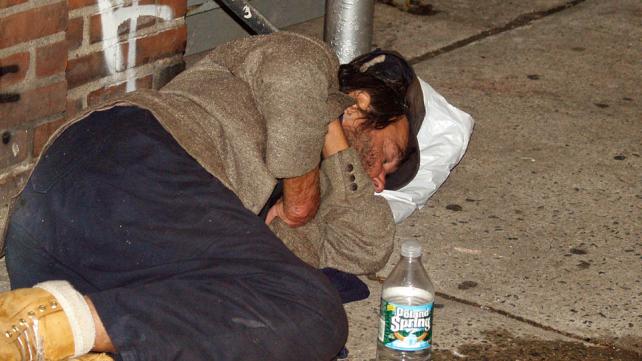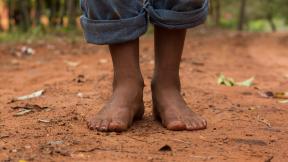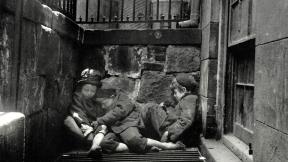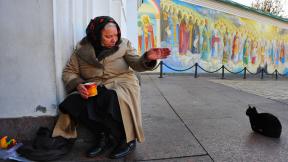
The Mother of Homeless in Chicago
It was almost 4 p.m. and Aisha knew exactly what she was going to do.
Living and working in downtown Chicago, it was part of her daily ritual: whatever money she had earned at work, every weekday, she would use for food.
Not for herself. But for the homeless.
She would prepare sandwiches, put them in two large grocery bags, then walk around the tall buildings in downtown Chicago giving them out to the poor and homeless who otherwise would be scratching the garbage baskets outside fast-food places, collecting bits of food.
Aisha didn't make just any kind of sandwiches though. She was well aware of the needs of the homeless and needy. She knew what was necessary for their diet, what was good and bad for their digestion, and what kind of food she had to make for them.
Eventually homeless people figured out where her apartment was and they would sometimes also come by. Her apartment building's management was not happy about it. But it was Allah's pleasure Aisha was after.
She was known among the Muslims in Chicago as the mother of the homeless. I did not know how long she had been a Muslim.
The first time I met her was when we were thinking of starting a soup kitchen to be run by Muslims in Chicago.
She came by Sound Vision for a meeting. A well-to-do Muslim engineer who himself had just came out of a homeless shelter, losing everything to his former wife, was also present. We were both pleasantly surprised about Aisha's level of knowledge about the food habits of homeless people.
But it seems, no one was there to make sandwiches for Aisha when she became homeless herself.
From helping the homeless to becoming homeless
How could a person go from helping the homeless to becoming homeless herself?
Masjids go up. Schools get built. World disasters attract donations. But we failed to get that soup kitchen up in Chicago.
Masjids were reluctant to give space for this project and the cost of renting a place in downtown, where the homeless are found, was prohibitive. And very few of us were interested. We lost contact with each other.
The next time I saw Aisha was at an Islamic center in Chicago. I was there to drop off my wife to the Quran class she used to conduct there.
I saw some worried faces in a corner of the busy hallway of the Islamic center. It was a Sunday around noon: the prime time of activities in Islamic centers: very busy, hectic, meetings, kids, phones, cell phones, hugging, kissing, shouts of 'Salam' and loudspeakers with lectures. But these faces in the corner were distinctly alone.
I was wondering about them when I spotted Aisha. "What are you doing here?" It took her a few minutes to recognize me and open up.
These people were waiting for Zakat committee members to see them and process their applications. The committee members were nowhere to be found. Weekend Islam is a difficult business.
To my surprise Aisha was homeless herself and was looking for a loan.
She needed it to pay a one month advance so she could rent an apartment. She had already secured a new job. She wanted to pay back that money to the Islamic center as soon as she earned it.
How Aisha Became Homeless
Here's what happened: Aisha had met a fellow Muslim who expressed an interest in her. They married and he convinced her to stop working. She did.
But her husband later left for Tableegh, never to return, leaving her penniless, and eventually homeless. The dilapidated apartment building which was their home was eventually closed down by the city of Chicago because of a number of violations.
Aisha was left with no money and no shelter. She was alone. She was homeless. She was in need.
How the mosque's Zakat committee failed her
As a Muslim, Aisha turned to the first Muslim institution that is supposed to help people in need: the Masjid.
When she came to the Masjid for help, thankfully, this was one of the mosques that had a Zakat committee in place to help Muslims who were in situations like Aisha's. This is also a Masjid with a net worth of over $4 million, so its administration was definitely in a financial position to help the needy.
But she received no money from the committee. She had filled out the Zakat committee's application form to get some financial assistance. This was her third visit to the Masjid. The committee had difficulty meeting.
I had no reason to not believe Aisha, the Mother of Homeless in Chicago. I knew the Masjid.
Sometimes I give Friday Khutba (sermon) there as well. I started looking for its leaders. I learned that the Zakat Committee people were not there. The poor people would have to come back again. I offered the leadership my personal guarantee. But nothing worked.
Sometimes systems and processes become inhumane without us meaning to make them like this. I felt I should never give Khutba there anymore. I remembered to be patient.
Personal donations helped her out
Aisha did eventually get back on her feet that day, with the help of some personal donations from Muslims who didn't have enough even for themselves, but did have the heart and compassion to help her out immediately. No wonder the lowest income group pays the highest proportion of their income in charity as compared to better off people in society. May Allah reward them with the best and give Barakah (blessing) in their livelihood.
There are at least four lessons we can learn from Aisha's sad and true story.
One: behind the homeless and the hungry person you see in America, the land of abundance and opportunity, is a human being who never had any intention of becoming destitute and needy.
Two: our Islamic institutions have failed to adequately provide for the needs of those who are truly destitute and in dire circumstances. There has to be an organized, discreet and systematic way to run Zakat committees and the distribution of these funds to those who need them. There has to be immediate follow through on each case where someone in need asks for assistance.
Three: Sister Aisha's knowledge of the homeless, experience, talents, and confidence should have given her a place in the leadership of the community so she could guide us in establishing these programs for the poor.
Four: Imams, presidents, or whoever is most available in Masjids should be authorized to disperse some Zakat funds immediately for urgent needs without the committee processes which are subject to erratic volunteerism.
How many others Aishas are out there?
Where is Aisha today?
How can we know? We failed her.
May Allah reward her wherever she is. Allah never fails His servants.
"Street Sleeper No 16" by David Shankbone - David Shankbone. Licensed under Creative Commons Attribution-Share Alike 3.0 via Wikimedia Commons - http://commons.wikimedia.org/wiki/File:Street_Sleeper_No_16.jpg#mediaviewer/File:Street_Sleeper_No_16.jpg








Comments
I am upset and heartbroken because this could be my story. Who knows how many muslim are suffering by the hand of other muslims in leadership roles. May Allah raise up a better people and community then what is out there now. Ameen.
Location
Assalamu'Alaikum. This story has inspired me to actually go out and learn more about my local Masjid & our zakaat operations. If I can be half the person Sister Aisha is, I will be the happiest person in the world.
Location
assala mu alay kum.I found the story of ayesha very sad, i think that stories like this help motivate us muslims to strenghthen our faith and to do something about there way of life and not take things for granted because life is too short.
Location
Assalamu Alaykum,In actual fact sister Aishah is among the once Almighty Allah said in Holy Qur'an, for kind of help she rendered to the homeless people when they in need and is Allah that could reward her for all what she has done so far. My prayer for her is that, may the peace and blessing of Allah always be with her anywhere she may be now.And for all muslims through all over the world,what sister Aishah did should be practise by every one.May Allah in His aboundance mercy continued to be us all and guide us through His only religion alright. Ameen.Sharafadeen
Location
Salaam, This story speaks to the problems of the muslims in America. We need to seriously look at how we treat our women first and foremost and how we should bring the Quran to life instead of just reading and reciting it. Muslims got to do a better job of being apart of the community, instead of standing in the masijid criticizing it. I pray that Allah forgives us for taking the greatest faith and hiding it. We profess to uplift women, but I question that, do to the world wide treatment of the very "earhtly heavenly" blessing that is spoken of by the Prophet Muhammed.
Location
Infact, Aisha has successful in this world & may Allah reward her abundantly. I think sound vision shld educate the muslim on how to do proper Dawwah without inflicting pain on others, b/c Aisha's husband has made her to expreienced such agony.may Allah forgive us all.
Location
This story moved me. I wish I had known Aisha and met her. There is so much to learn from such great human beings. May Allah protect her and reward her for all her hardships.
Location
May Allah SWT bless sister Aisha with the best position in this world and in the hereafter - Ameen Summa Ameen. This story bought tears to my eyes. May Allah SWT bless me too with hidayah to serve our community like this - Ameen, Summa Ameen.
Location
dear sir, I was very sad after i read the story of sister Aisha. I can't understand how such things can happen to a sister in islam. She always should be protected by someone, I mean by a husband, a brother, a member of the family or the islamic communauty.Women play an important role in islam, so they should be taken care. Such things won't happen in my country in senegal.We are a poor country but there ais a great solidarity among muslims here. We share everything. Islam is not a fashion. It's the real deen in the sight of Allah, the Creator. We should be steadfast and truthful. We should help each other. We should share everything. Tommorrow is not guaranteed. Life is too short. So we should do googd things to be rewarded Paradise.a sister like Aisha won't be homeless. THat's not correct in islam.I am really desappointed and angry.What can we do to help her.I am looking forward to hearing from you.
Location
Dear Sir,A-sallam-alaekom !I was really very very sad to hear about the sisterAisha. What I believe is, that there should be noformalities at all to give sadaka or help to the poorpeople. And, the sadaka or help should be givenon the spot because when a man/woman comesfor sadaka or help that means they donot have anyalternative so they come for sadaka/help whichshould be given on the spot I repeat on the spotwithout any formalities. Because we do not knowwhat troubles they are facing at that time at thatmoment because that is the last possibility thepoor muslims expect help from.I thank you and A-sallam-allaekom !Kind regards,Ahmed VinodYemen
Location
Pages
Add new comment